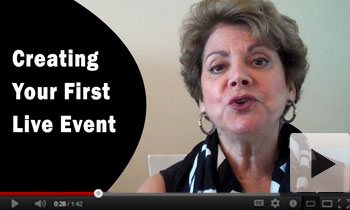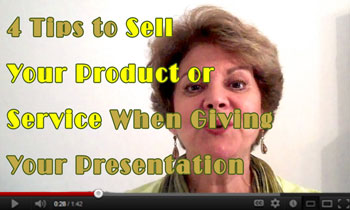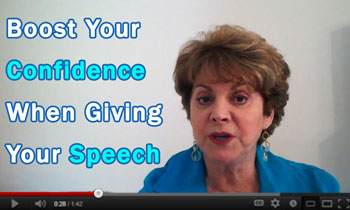
Studies have shown that one of the top fears people have is speaking to groups. For some people, when it comes to speaking, they'd rather be the one being eulogized than the person giving the eulogy! I've taught speaking skills to many people over the years and most people are nervous when they first get up to speak. They're worried about how they look, what others think of them, what if they forget what to say?
Even well-known celebrities have admitted fears of speaking in public. Barbra Streisand stopped singing for 20 years due to her anxiety about performing in front of an audience. Donny Osmond wrote a book about his life and his performance anxiety, and Sir Laurence Olivier recounted in his autobiography that he suffered a social phobia for five years.
How many times have you watched a speaker and thought, “I can do that!” And then that little inner critic in your head starts making noise and tells you, “Who am I kidding! I’m not a speaker… I can’t do this.” The more you think these thoughts, the more you believe it’s true.
The truth is none of us was born a natural speaker.
When the little inner critic starts making noise, what you should be saying to that voice is, “Thanks for sharing!”
Don’t let your inner critic sway you from staying in action mode. It’s in default mode trying to sabotage you with limiting thoughts and beliefs.
There’s nothing wrong with being a little nervous before you speak. In fact, a little bit of adrenalin is good because it keeps you alert, focused and energized as you speak.
Let’s take a look at 5 steps to help you overcome the fear of speaking:
- Visualize your success as a speaker. Spend a few minutes daily, several days before you deliver your talk, visualizing yourself giving a great presentation. Imagine the audience smiling as you speak and applauding at the end of your presentation. The more you can see yourself doing a great job speaking, the more real it will become for you.
- Know the first 3 minutes of your talk. Most speakers are most nervous at the beginning of their talk. There are a lot of things happening in those first three minutes. Your adrenalin is flowing and you want to deliver a great presentation. Make sure to be well prepared by rehearsing those first three minutes several times over so you know your material well. Once you get through those first three minutes, you’ll feel more connected to the audience and begin to relax.
- Connect with the audience. Look directly at people as you speak for no more than 4-5 seconds. You want to feel the energy of the audience and they want to feel your energy too. This will help to calm your nerves and keeps the audience paying attention to what you say.
- Meet with the audience before your talk. Many new speakers say they feel most nervous at the beginning of their talk when they first look out at the audience. It’s understandable to feel most vulnerable when you’re speaking to a group of people you don’t know. An easy way to break the ice with the audience is to arrive and mingle before your talk. Understand the audience is on your side. They came to hear what you have to say and want you to win!
- Focus on the audience. Your job as a speaker is to deliver value to your audience. With the initial nervousness that many new speakers experience, it’s easy to make it about yourself having thoughts like… “Will they like me? Am I doing a good job? What if I fail?” Put these thoughts aside and be out there with the audience. Focus on your message and the difference you’re there to make for them!
If you would like to use this article on your website, or for your own ezine, not a problem; however, there’s one thing you MUST include: Rochelle Togo-Figa, The Breakthrough Expert, is the creator of the Speak Like a Pro System™, a proven step-by-step process that will help you become a confident and successful speaker attracting more clients with ease and velocity. To sign up for her free speaking articles on speaking, visit www.SalesBreakthroughs.com.




 Studies have shown that one of the top fears people have is speaking to groups. For some people, when it comes to speaking, they'd rather be the one being eulogized than the person giving the eulogy! I've taught speaking skills to many people over the years and most people are nervous when they first get up to speak. They're worried about how they look, what others think of them, what if they forget what to say?
Studies have shown that one of the top fears people have is speaking to groups. For some people, when it comes to speaking, they'd rather be the one being eulogized than the person giving the eulogy! I've taught speaking skills to many people over the years and most people are nervous when they first get up to speak. They're worried about how they look, what others think of them, what if they forget what to say?

